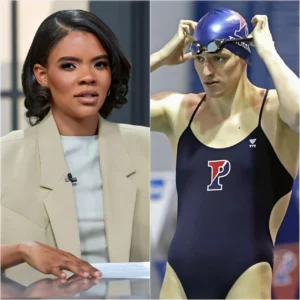“This Has to Stop Now!” Candace Owens Demands Action Against Transgender Athletes in Women’s Sports
Political commentator Candace Owens has sparked controversy by publicly calling for transgender swimmer Lia Thomas to be banned from women’s sports. In recent comments, Owens claimed that allowing transgender athletes to compete in women’s categories is “unfair” and urged sports organizations to act quickly.
Owens made her views clear on her podcast and social media, saying: “It’s not fair that biological women, who train their whole lives, have to compete against biological men. This has to stop now. Women’s sport is being destroyed.”

Owens, who is known for speaking on gender issues and sports, argued that transgender athletes undermine the fairness and integrity of women’s competitions.
Lia Thomas, a transgender swimmer who competed in the women’s NCAA competitions, has been at the center of this debate since achieving significant victories in collegiate sports. Some support her right to compete, while others, like Owens, believe her participation creates an unfair advantage.
Thomas has followed all NCAA regulations for transgender athletes, including those concerning testosterone levels. However, criticisms like Owens’ reflect a larger conversation about balancing inclusion and fairness in sports.

Owens’ comments received mixed reactions:
Support for Owens: “Candace is saying what many people think but are afraid to say. Women’s sport must be protected.” “This is not about hate, but about justice for female athletes.”
Criticism of Owens: “These statements only encourage discrimination. Lia Thomas has the right to compete.” “Candace is just trying to gain attention, not to solve the issue.”
The Lia Thomas case has sparked a worldwide debate on transgender athletes’ participation in women’s sports. Those who advocate for inclusion believe current policies provide a balance between equity and human rights, while critics call for stricter rules to ensure fairness in competitions.

The Debate: In Favor of Inclusion: These supporters back policies that let transgender athletes compete based on their gender identity, stating that excluding them would be discriminatory. In Favor of Restrictions: Others argue that natural physical differences can give an advantage, which harms the fairness of women’s sports.
Candace Owens’ comments could push sports organizations to reconsider their policies. However, finding a balanced solution remains complex and highly divisive.
Owens has stirred a heated debate that continues to divide opinions both in and out of sports. While some view her position as necessary to protect women’s sports, others see it as promoting exclusion and discrimination. This debate is far from settled, highlighting the need for a thoughtful, data-driven conversation.
